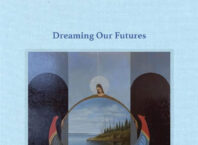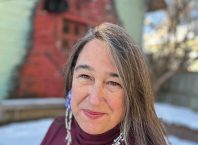
Review by Deborah Locke
“We Are Meant to Rise,” edited by David Mura and Carolyn Holbook, consists of essays by American Indians and people of color recounting the 2020 murder of George Floyd, the effects of the pandemic in 2020, and much more.
The book arrived in the mail, and then sat on my nightstand, staring out, subtly requesting attention. I stared back at the book, wondering about the personal impact of essays that recounted the national nightmares emanating from murder in real time, and COVID. Hadn’t I read enough, felt enough, cried enough about all of that? How much more could I take?
The book stared back. I opened it, started to read and could not put it down. Dear reader, if you like hearing the words of language masters, if you seek hope, or want to walk in the shoes of another, if you want stark clarity and unbridled truth, read these essays.
The book, published by the University of Minnesota Press, grew from the first five years of More Than A Single Story (www.morethanasinglestory.com)
One of my favorite essays by Kevin Yang, “Speaking Into Existence,” tells his story which includes the escape of his parents from Laos and Thailand. They eventually settled in South Minneapolis. Kevin grew up ashamed of his Hmong heritage, writing that he avoided all things associated with being Hmong. His own racism was internalized, until he found his way into a creative writing class that he said, saved his life. Kevin’s writing assigments that now highlighted his Hmong experience in Minnesota were well-received by teachers and students alike.
Novelist Louise Erdrich’s essay “Humility, Sincerity, Banana Oil” tells the story of her grandfather, Pat Gourneau, who embarked on a one-man campaign to prevent the federal government from dissolving the Turtle Mountain Band of Chippewa located in North Dakota. Mr. Gourneau convinced other Band members to understand the Termination Bill and its impact on their lives. A group of Turtle Mountain members flew to Washington, D.C. where they went through grueling days of convincing a hostile Congress to drop the legislation. Whole tribes were terminated as a result of that campaign, but Turtle Mountain was spared.
Before that happened, the small committee of Band members were scolded by bill author Arthur Watkins of Utah, who said it was time for Indians to “stand on their own two feet and become a white and delight some people as the Book of Mormon prophesied they would become.” The quote gets much worse. What I took away from the essay is the way a small grossly underfunded but focused and determined group of Indians can turn aside injustice and governmental incompetence. That’s a lot to take from a very short essay.
Another writer, Ricardo Levins Morales in “Four Genies,” points out that during the early COVID months, working people, cooks, drivers, nurses, fast food workers, were praised as heroes. These, the “…very people whose supposed insignificance has long been the justification for low wages and shoddy treatment. Their demands for safety protocols, paid sick leave, health coverage and corporate closings have resonated widely and have won significant concessions. CEOs and billionaires, on the other hand, could all disappear and no one would notice.”
Then he adds that that’s not exactly true, since the wealthy have made loud smacking noises as they gorge themselves from the public treasury while simultaneously crying for rollbacks of pollution, labor and food safety protections while demanding that their workers return immediately to the sacred task of producing profit.
One of the more unique essays is entitled “A Tangent to a Story About the Smith & Wesson .38, or, Attempts to be Fully Assimilated Into the White American Project Have Failed Miserably in the Form of a Self-Questionnaire” The writer, Sun Yung Shin, conducts an interview with himself that tells almost nothing about his experience of being adopted from Korea. Sometimes a writer doesn’t care to share.
Mostly, these writers do share. It stings to read first-hand accounts of Minneapolis burning through those summer nights. They’re there. It stings to read about the death of a family member and a funeral where everyone wears white. Other topics: fatherless children. Children who raise themselves because their parents are gone, working. Children like Kevin Yang who abandon shame and push their talents as far as they will go.






